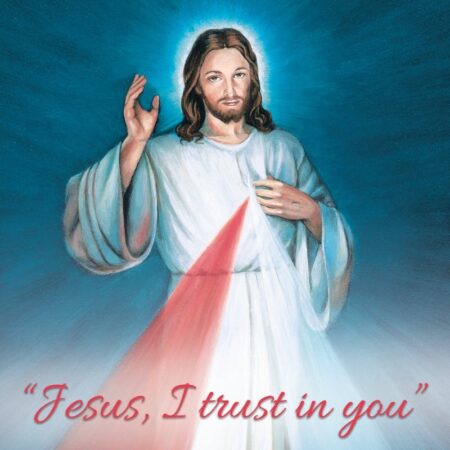In a series of revelations to St. Maria Faustina Kowalska in the 1930s, our Lord called for a special feast day to be celebrated on the Sunday after Easter. Today, we know that feast as Divine Mercy Sunday, named by Pope St. John Paul II at the canonization of St. Faustina on April 30, 2000.
The Lord expressed His will with regard to this feast in His very first revelation to St. Faustina. The most comprehensive revelation can be found in her Diary entry 699:
My daughter, tell the whole world about My inconceivable mercy. I desire that the Feast of Mercy be a refuge and a shelter for all souls, and especially for poor sinners. On that day the very depths of My tender mercy are open. I pour out a whole ocean of graces upon those souls who approach the fount of My mercy. The soul that will go to Confession and receive Holy Communion shall obtain complete forgiveness of sins and punishment. On that day are opened all the divine flood-gates through which graces flow. Let no soul fear to draw near to Me, even though its sins be as scarlet. My mercy is so great that no mind, be it of man or of angel, will be able to fathom it throughout all eternity. Everything that exists has come from the very depths of My most tender mercy. Every soul in its relation to Me will contemplate My love and mercy throughout eternity. The Feast of Mercy emerged from My very depths of tenderness. It is My desire that it be solemnly celebrated on the first Sunday after Easter. Mankind will not have peace until it turns to the Fount of My mercy.
In all, St. Faustina recorded 14 revelations from Jesus concerning His desire for this feast.
Nevertheless, Divine Mercy Sunday is NOT a feast based solely on St. Faustina’s revelations. Indeed, it is not primarily about St. Faustina – nor is it altogether a new feast. The Second Sunday of Easter was already a solemnity as the Octave Day of Easter. The title “Divine Mercy Sunday” does, however, highlight the meaning of the day.
By the Faithful Disciple
GROW AS A DISCIPLE
“I’ll believe it when I see it.” We’ve all said this at some point, usually in response to hearing about someone unreliable doing something out of character. St. Thomas had the same reaction in today’s Gospel when he wasn’t there when the other disciples saw Christ for the first time since he rose from his tomb – “Unless I see the mark of the nails in his hands and put my finger into the nail marks and put my hand into his side, I will not believe.” Although Jesus helped Thomas with his unbelief, he blesses those who have not seen, but believe. Have any of us seen the nail marks in Christ’s hands and feet, or the wound in his side? Do we see Christ’s body and blood on the altar, or do we see only the gifts of bread and wine? Christ comes to us in ways we can understand initially – parables, bread and wine, the face of people we meet throughout our daily lives – but our faith in what we have not seen, in the great mystery of our salvation, is what makes us Christian.
GO EVANGELIZE
In today’s first reading, we hear reports of the lives of the first disciples soon after Pentecost: communal living, breaking bread together, prayer, selling of their property and possessions and redistributing among themselves according to individual needs. To our ears today, this idyllic community living seems almost incredible. Yet these first disciples were infused with the Holy Spirit, who enabled them to proclaim the Gospel and think of others before themselves. As Christ’s disciples today, how are we behaving toward one another? If we truly are among those who have not seen and yet believe, let’s act in full confidence. As we heard in the second reading, our faith is “more precious than gold that is perishable even though tested by fire.” We certainly aren’t perfect, and our faith at times can be sorely tested, and yet this is our call: to share this faith by doing good works in Christ’s name to make disciples and build the kingdom of God.
INVITATION: People often see Christ through the words and actions of others. This week, actively seek out opportunities to be the hands of Christ. What opportunities does your community have to practice corporal works of mercy?

